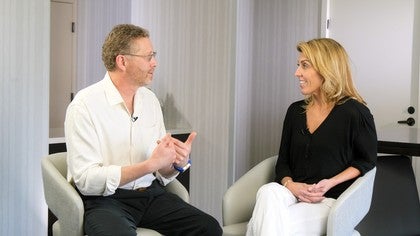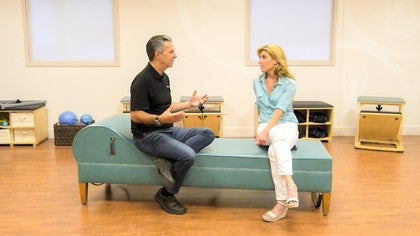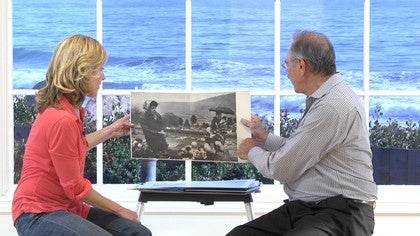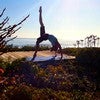Description
After the initial lawsuit, there was 5 years of pretrial work, when they took depositions of leaders in the industry including Amy Taylor Alpers, Rachel Taylor Segel, and many others. During the trial, they were in the courtroom for 11 days, during which Ron Fletcher, Romana Kryzanowska, and Kathy Grant testified on the witness stand. In the end, the judge ruled that Pilates was a generic term. The results of this case had a huge impact on everyone in the Pilates industry, and it ultimately led to the beginnings of the Pilates Method Alliance.
About This Video
Transcript
Read Full Transcript
Chapter 1
What Was the Dispute?
Hi, I'm Kristi Cooper. It's another great day in the Pilates studio, although we're not actually in the Pilates studio. We're here at the Pilates Method Alliance and I just tracked down, finally, Gordon Troy, who was the attorney for Ken Endelman and the class action suit for the trademark lawsuit from 1995 through 2000, deeming Pilates a generic term. Welcome. Thank you. It's great to be here. It's great to be at the PMA because it's an awesome organization to bring everyone together. It's a lot of history of how we got here.
and basically tried to use the trademarks to prevent the Pilates community from using the word Pilates to describe this method of exercise. And he went one step further though in that he actually went out and registered the word Pilates for exercise equipment and they had previously only covered the use of Pilates for exercise studios if you will, and threatened to sue and ultimately sued Current Concepts and Ken Endelman of Current Concepts, which was the previous name for Balanced Body, I'll just talk to them as Balanced Body since that's how they're known today, and sought to prevent them from using Pilates to describe this method of apparatus.
Oh, that's super key. Yes. So that was the monetary piece for them. Okay. In addition to the training piece, which was what the original trademark was all about, which was that they were providing exercise instruction services. Okay. It gets confusing. It's very confusing because there were actually two other lawsuits going on at the same time. Yeah. We'll get there maybe, or you tell me. Well, it gets interrelated because what was happening was they had already sued a number of entities over the years, and they being Pilates, Inc, Sean Gallagher. And the first of that being the Pilates Institute in Santa Fe. The Pilates Institute actually filed a cancellation action in the trademark office, but never really followed through on that, and it got settled. It got settled in some kind of a mysterious way that Pilates, Inc thought that, well, now we've got the entire Pilates community agreeing that we're only going to say that what we're doing is based upon the principles of Joseph H Pilates, and some other kind of garbled thing that made absolutely no sense,
and then from that you found a lot of people were saying that they were doing Pilates-based during that period of time. So subsequent to that, there were several other lawsuits. There were lots of cease and desist letters that had gone out at that point in time, like upwards of a hundred at that point. What point is this? What year is this? We're in the early to mid nineties. This is before 1995, and that's important to understand. So that at that point in time, in 1995, there were two other lawsuits that were pending. One was filed against Deborah Lessen for using Pilates in, I think it was in either the phone book or in a flyer or something like that, and the other was against a gentlemen in Washington, DC, Will Green and his studio. It's funny because Deborah Lessen's was called Greene St. Studio and his studio was called Green something else. So those two lawsuits were also going on at the same time. And at the time of Deborah Lessen, we speed up about a year, so now we're into mid 1996. In the Deborah Lessen case, nothing had really transpired in the case.
They hadn't done any discovery, no depositions or whatever. And I had to go to court on the Ken Endelman and the Balanced Body case, and it's part of the procedures that you'd meet with the judge early on in the case, and you'd discuss the case and what's going to happen, what's going to transpire. And Ken Endelman said to me, "You should go meet the lawyer for Deborah Lessen." I met the lawyer for Deborah Lessen, and we talked about the whole case, and we came up with a strategy at the time to actually file a motion for summary judgment on the basis that the mark was generic. We submitted all this evidence and stuff, but it was in front of a judge who at the time really wasn't paying attention to anything because he was potentially under indictment from letting a prisoner out, and he wasn't focusing on the case and he didn't have any time for it because the prisoner went out and did something bad or something. I don't remember. But anyhow, at the time I wasn't actually in court that day because it was the Deborah Lessen case, but the Pilates, Inc attorney said, "Will you agree to abide by whatever decision occurs in the Balanced Body case, and we can settle the case on those terms?" Meaning, because they knew that I was about to counter-sue that the mark was generic and that we were going to pursue it that way. And of course they agreed to that because it makes the problem go away. There was a minor problem with that, and that is that Ken Endelman and Balanced Body were sued for using the trademark "Pilates" on equipment. Yet Deborah Lessen had been sued for using Pilates, and purportedly the Pilates Studio, on exercise instruction.
And they were two different things. So out of that, we came up with the brilliant idea to counter-sue on a class action so that we could then represent all of the people in the Pilates community. And the net effect of that was, it allowed them to then be protected by the lawsuit. So that during the pendency of the lawsuit, every time that Pilates, Inc would send out cease and desist letters, we would send letters to them saying to stop talking to our clients. If you have a problem, talk to us.
If people are on a Reformer and they're being exercised, what am I doing? I'm doing Pilates. That's why I'm here. I'm doing Pilates. So it was, that was kind of a really pivotal point in the case, and being able to produce the evidence. So by making it a class action, you could bring Deborah and Ken's separate cases as one under that umbrella. As well as all the other people out in the community. Otherwise they would've had been tried separately.
Chapter 2
Getting Involved with Current Concepts
How did you get involved initially with Balanced Body or Ken and Current Concepts?
Sean Gallagher's place? Well, she went there and she was like, "Well, this can't be what Dr. Levine had in mind," because you know, it was on the second floor above the Fairway, which is a grocery store on Broadway. And from there they went to the Canyon Ranch, my mother and my sister, and they had a week vacation there. And from the Canyon Ranch, it was Karma Kientzler who had been involved in that from its inception. And they then found out about the Pilates Institute. And from there they became members, I think my sister and my mother, one or both, I don't know, became a member.
And then they heard about Current Concepts at the time, and Balanced Body for the apparatus. So speed forward, about a year after going to the Canyon Ranch, my sister calls to buy a Studio Reformer from Balanced Body. And in the conversation, Ken started talking to her about this trademark problem that he's having and starts explaining all this stuff. And my sister says, "You know, just give my brother a call. He knows this stuff. He's done this. He's defended the Jeep trademark. He's done all kinds of crazy stuff like this in his life. Just give him a call. He'd be happy to talk to you." That's how the world works, I guess. So low and behold, Ken calls. And this is actually because Ken, after the aftermath of the Pilates Institute case, which became the Physical Mind Institute, Ken had formed a non-for-profit called the Joseph H Pilates Foundation that had been sued by Sean Gallagher. But it didn't have any assets or anything.
It was just starting. And so that case got settled. But that was before I was involved. And then when, just prior to him getting sued by Pilates, Inc, he calls me and we had a whole discussion about what was on the table and why he was negotiating and I didn't hear anything for maybe about two months. And then I got a call from Ken and he says, "I've just been served with this suit. Will you represent me?" And why did you take it? Because it's fascinating. It is fascinating, but it's not so obvious to me why it would be fascinating to someone who's already in the business. I mean, you've worked with the Jeep trademark. Why is it fascinating to you? Because first, there's a couple of key pieces here. First of all is that what they were trying to do is they were trying to protect the method of exercise through the use of the trademark by preventing people from being able to call what they were doing by what it was known as. That's the essence of what they were attempting to do.
And that doesn't fall under any rubric of any kind of law because patents protect new and useful inventions, copyrights protect the expressions of ideas, trademarks protect the symbols by which goods or services are sold in the marketplace, and trade secrets are things that are secret of commercial value. So there's no prong to hang your hat on, to be able to prevent people from saying this, yet that's what they were attempting to do. And they had kind of scared the community into believing that they had some right greater than they actually had. And it was wrong. And I don't like things that are wrong. And you knew all of that before you accepted it. Yeah. I mean, even back when I first heard about it and I did some research and looked into it and got some additional information, because I think I might've had a couple of calls with Kenny before he had been sued. And I said, "You know, this is generic.
It's the same kind of an issue. Like I can say to go get a Kleenex and it might be in the other room, but you know to go get it if it's a Palms, you'll get it for me, and you know the difference. That also invokes the whole concept of dual meaning. And there are trademarks that have dual meaning within the minds of the consumer. Thermos is a perfect example. Earlier when we first opened this, you said that it was just a basic case, a simple case, a simple trademark infringement case, sorry. Yes. You're the lawyer. Under normal circumstances it would have been a classic trademark infringement case except that there were all these reasons why it wasn't.
And they were settled because people can't afford it. I mean, a trademark lawsuit, today even a simple, straight forward trademark lawsuit is going to run into the hundreds of thousands of dollars. But a generic system case is a lot more expensive because you have to do a survey because the courts require a survey in order to prove that the mark is generic, which is the way to bring evidence in from the outside for the court to consider, to understand what is the consumer perception of the use of that word, which is ultimately the key piece. How do the consumers view the use of the word Pilates? And obviously we did a survey, they did a survey and said it wasn't generic, and we did a survey that it was generic. But when we finally drilled into their survey, and the judge totally picked this up, they were basically asking the wrong question. You know, what's so interesting to me about all of this genericism is that at the time I was teaching, but I was still pronouncing Pilates. I mean, I still struggle with that, telling people what it is, and yet, Ken Endelman, Deborah, everyone was so willing to know that it was a generic term, but it wasn't prevalent yet. So it's just ironic to me that this huge case happens.
At the time we were all calling it Pilates, and we're all doing Pilates, but at the same time it wasn't out in the world the way Jeep and Kleenex and other examples we're talking about. But you still knew that the way it was being used, however small, was generic. I just thought it was interesting. Yeah. Clearly within the yoga and the mind, body, spirit, kind of movements, I mean, Pilates was well recognized as being a discipline or a modality, depending upon your terminology and your professional orientation. So within the industry, in similar industries anyway, but clearly back in, even into 2000, I think the general population, if you had done a survey on the street in the top 20 cities in the United States and said, "What's Pilates?" I think the number of people that would know would have been pretty low. Okay, so the survey is not just the general population. Well the survey that was done was actually done with Pilates professionals.
Okay. That's where my head was. That was kind of, if you went out and asked anyone, they're not going to not know it at all, but that's not who they were asking. Okay. So you get going on the case and, first of all, how long was this case? Well actually, Ken and I were just discussing this last night, night before last. He thinks he was sued on December 24th, and I think it was January 3rd, so it's 1996 versus 1995, but it was right in that time frame. I could probably find out from the court records somewhere, but the case went on trial in June of 2000. And he was served in '95 or '96? Yeah, right at the beginning of the year there. So the case was tried in June, but then because it was a bench trial in front of the judge, we had to do post post-trial briefings, and that went on for another two months after the end of the trial, which was basically each side explains to the judge what the evidence was and applies it to the law and why we should win and why the other side shouldn't.
And that happens after the actual trial? That happened after the actual trial. And then we had the decision in October of, I don't know, it's on my website. 2000. Yeah. We probably got in about 25 or 30 depositions that had been taken,
and the way that works is that each side agrees to which depositions are going to go in. We each mark what the judge is going to read and that's what gets submitted to the judge as testimony in the case, even though we had taken depositions because throughout the case, we had taken, I don't know, I've lost count, but it was well over 50 depositions. Days of depositions in the case. And we had, I mean, just mountains and mountains of depositions. Who were you talking to?
Well, we tried to focus on cities. So one of early cities we did, believe it or not, was Boulder. And there was actually a great quote early on in the case where you could have laid Reformers end to end, one end to the other from one end of Boulder to the other because there were that many people practicing Pilates there. Really? Yes. Wow. So you went there first? We went there and we took the deposition of Amy Taylor. We took, no, actually we took Amy and Rachel. That was actually kind of bizarre. We actually took Amy and Rachel together. I think we started with Amy, and it was really clear because Rachel was sitting in the room, that she kept looking at her for an answer, and I was like, okay, can we just take both of theirs together? And the other side agreed. And it actually worked out very well. And Amy actually testified at the trial also. We'd actually took Ron Fletcher's deposition in Boulder. He was there for that. I'm pretty sure that's where we did his.
and that's who got assigned to the case. There was another thing that happened. We dropped from our part of the case a claim for damages, and they dropped from their side of the case a claim for damages so that the focus was exclusively on the trademark itself, the validity of the trademark. And by doing that, because on the eve of trial, the judge had basically dismissed the class action, which was a blessing in disguise so that when the case actually went to trial, it was Ken Endelman and Balanced Body who were the defendants in the case and the counterclaim plaintiffs in the case, and Pilates, Inc was the plaintiff and the counterclaim defendant, but because there were no damages being sought at that point because it became patently clear that that was just a nonstarter for anybody to be able to prove, then it has to go in front of a judge as opposed to a jury. Because juries can't decide cases that are strictly on an equitable basis.
Chapter 3
The Trial
And the plaintiff's counsel had to turn to me to get the specifics of each of that information. And I was really kind of surprised by that, and I think the judge was surprised by that as well. So that was kind of interesting from a starting viewpoint. Because now all of a sudden, the judge is looking at me as kind of being, okay, there's the law expert here. You know? So did you rest easy after that? No, you never rest easy in trial because you've got a limited amount of time to present evidence. So on the first day of trial, the plaintiff proposed, so that the judge would understand what we're talking about, that we recess and we go to a Pilates studio so that the judge can see what we're talking about. So this is brilliant.
So we're like looking at each other, and of course our side said, "Well, if they're going to take you to one of their studios, we hope you're going to give us an opportunity for us to take you to one of our clients' studios so you can kind of see." And she said, "Well, I'll reserve my judgment on that. We'll see if we need it," which was a fair answer. So we go to Drago's, because that's where Romana is working. Basically that's her base of operation. Okay, just for a visual, who is we? Thank you, that's a great question. We're talking all the lawyers, the judge, the judge's law clerk, actually both of the judge's law clerks, plus the court reporter, and the clients. Okay. And we all go there, and Romana has somebody obviously queued up to do a Reformer workout, and they go through and they do the 20 minute speedy Reformer workout, and they're going through it and we're just watching, and she's narrating what's happening. And she's all done, and Romana puts her hands down on the woman's ankles, and when they're all done, she goes, "How was that?" And the woman answered, and I'll never forget this to this day, "That was different." I mean, I wish I had a camera to have taken a picture of the judge's face at that moment, because you could just see that she got it.
She understood that we were talking about a method of exercise that is always changing, is always different because it has to be malleable to deal with the individual. And that's where Joe Pilates was brilliant. And Romana too, right? I mean, she's known for that. Right, no question. Yes. I've heard bits and pieces of testimony from the teachers. I've had Romana, Ron Fletcher, Kathy Grant. Who is most notable for you of anyone? Well actually, I thought they were all notable. And I have to say that asking people who, you know, are elderly, to testify in court about their life passion has its challenges. And I have to say that Romana, she did an amazing job. She really, she was clear about what she felt and what she believed.
Not that what she believed was completely correct, because she was operating under a misconception that the word would protect the method or methodology. Okay. But that's what she was told, and I can't fault her for a misunderstanding that she'd been explained. But, Ron was brilliant. I mean, he was flamboyant. The judge adored him. Okay. I always hear this, and I want to know the story behind the story. What did she adore? What did he do? What did he say? I mean, you know Ron.
Ron is lovable. Ron is just, he's flamboyant and he was just a magnificent person and he's the kind of guy who wore his life on his shirt sleeves, and he just came in that way with no pretenses. It was just, this is it. You know, we've all done this. I don't understand what they think they're doing. And this is nothing personal against Romana. It's just this. We want more people to be able to use Pilates because it's what we've all been taught. And you know, the nitty gritty of what we dealt with with Ron was, you know, there were letters from Clara to Ron, and Ron to Clara, because Clara, for whatever reason, he had a stronger bond with Clara than he did with Joe. I mean, he said that to me many times. And there were letters that say, "Go forth and do your thing in LA and you know I love you for it." And he was just, it was just dynamic. He was clear. He was great. The surprise for me was Kathy, because Kathy, as you know, was very quiet, very personal, introspective kind of person. She never wanted to be in the limelight about anything. I mean, that was Kathy. And, I put Kathy on the witness list, even though she told me that she wasn't going to be a witness.
And I'm not sure what changed other than I think Lolita talked to Kathy. And I got a call from Kathy. She said she would testify, and I met her on the Sunday of the trial. The trial had started Monday, the prior week. And I met her the Sunday in between, and we talked about it, and she said she'll do it. And she was fabulous. How so? She talked about the whole history with Bendel's, and how she was involved in it, and how she had her apparatus and because, first of all, she always had a very quiet voice, but because she was in court, there's a microphone, so you would have never known that about her.
And she was just as honest and genuine and straightforward with the judge, and there was just nothing the other side could do to make any hay there, so to speak. So the surprise was being able to get her to testify. Okay. And it sounds like all of them together were pretty important. Yes. What, what was the ruling? The ruling was very straight forward. It was that Pilates was generic. Oh, there's a point here though, that on the eve of trial, the judge said that she was not going to rule on the Pilates Studio mark because, even though we had countersuit to determine that to be generic, what went to trial was the use of Pilates both for exercise instruction and for equipment. Okay. Right. So, the ruling was is that they were generic, plain and simple.
The judge went out of her way to be super careful about to the extent that she never used the word "fraud." So we were never able to try and go after Pilates, Inc for attorney's fees, but Pilates, Inc really said they were going to appeal the ruling. And ultimately we basically settled in that we agreed that we would not go after them for attorney's fees if they agreed not to appeal the case any further. Well done. And we were done, and we had finality, which was kind of the key for the community because, and coming back full circle, why we're here in the PMA, is that we had a celebration party at the Power Pilates studio on 23rd Street in November following the decision. And it was the meeting that we had before the celebration party of about 25 or 30, maybe 40 professionals in the Pilates community. I didn't take a headcount. Kevin Bowen might know that number. I don't actually. You all say the same thing, and none of you have pictures of it. Well, in 2000 we did not walk around with cameras in our pockets. Anyway, carry on. So we were all there, and the birth of the PMA occurred at that meeting.
That's when we agreed that we were going to form a not-for-profit to bring the community together so that all these factions could stop saying, "Oh, he's not doing Pilates." That was dumb. It was. It's just like, we're all doing Pilates right now. All of these groups of people are doing Pilates, and we need to now bring the community together and come up with a mechanism so that the public can understand what Pilates is, what are the health benefits, how are we going to help so many people that have movement issues. I mean, the list goes on and on, and it was at that meeting. And here you are. There you were, and here we are today in 2014. I'm still involved, still working for the PMA. That's great. I really appreciate you talking to me.
I feel like this is where we can come back and keep talking about the rest of it, but thank you. Sure. It's a tough thing to explain, and I do still have questions, but I'll just have to have you back. Thank you very much.
Pilates Legacy Project: Pilates Industry History
Comments
Thank you for this interview.
Ken Endelman Discussion
You need to be a subscriber to post a comment.
Please Log In or Create an Account to start your free trial.




















